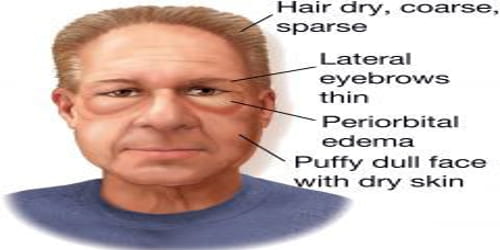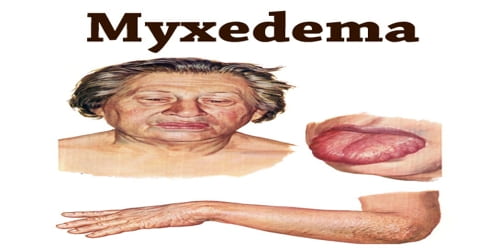Myxedema
Definition: Myxedema or myxoedema is another term for severely advanced hypothyroidism. This is a condition that occurs when our body doesn’t produce enough thyroid hormone. The thyroid is a small gland that sits right at the front of our neck. However, the term is also used to describe a dermatological change that can occur in hypothyroidism and some forms of hyperthyroidism.
The term also applies to the effects that hypothyroidism can have on the skin, making it appear swollen and puffy.
Myxedema is associated with other symptoms of underactive thyroid, also called hypothyroidism, including lethargy, weight gain, fatigue, depression, and cold sensitivity, among others.
The word myxedema originates from μύξα, taken from ancient Greek to convey ‘mucus’ or ‘slimy substance’, and ὁοίδημα for “swelling”. It can also be thought as nonpitting edema, in contrast to pitting edema.

Causes, Sign, and Symptom of Myxedema: Myxedema occurs because of severe hypothyroidism that is not diagnosed or is not treated successfully. It is known to occur in various forms of hypothyroidism, and also in Graves’ disease. One of the hallmarks of Grave’s disease is pretibial myxedema, myxedema of the lower limb.
Causes of hypothyroidism include:
- surgical removal of the thyroid
- medications that affect the hormone system, such as some for cancer treatment
- radiation therapy to treat cancer
- other medications, including lithium, beta-blockers, and anesthesia
- autoimmune conditions, such as Hashimoto’s disease
- iodine deficiency or an excess of iodine
- pregnancy
- sudden illness or infection
Myxedema is more common in women than in men.
Myxedema can occur in the lower leg (pretibial myxedema) and behind the eyes (exophthalmos). Severe cases, requiring hospitalization can exhibit signs of hypothermia, hypoglycemia, hypotension, respiratory depression, and coma.
Other symptoms of severe hypothyroidism can include:
- intolerance to cold
- tiredness
- weight gain
- drooping eye
- shock
- decreased breathing
- confusion
- apathy or depression
- psychosis
- constipation
- coarse hair
- goiter
- low energy
- seizures
- reduced mobility
- coma
- low body temperature
Myxedema can also lead to low oxygen and high carbon dioxide levels in the blood.

Diagnosis and Treatment of Myxedema: The patient’s symptoms will lead the doctor to suspect severe hypothyroidism. Blood tests can help the doctor confirm this. A thyroid-stimulating hormone (TSH) test measures how much TSH patient’s pituitary gland produces.
A thyroxine or T4 test can also be taken to measure a person’s T4 level. Low levels of T4 are a good indicator of hypothyroidism, especially if combined with high levels of TSH.
Characteristic symptoms are the weakness, cold intolerance, mental and physical slowness, dry skin, typical facies, and hoarse voice. Results of the total serum thyroxine and free thyroxine index tests usually will confirm the diagnosis.
Medication to replace the reduced thyroid hormones is the most common treatment, and when dosed appropriately, may halt the progression of myxedema.
Thyroid hormone replacement therapy is required in most cases of hypothyroidism.
Treatment involves administering thyroid hormone replacement medication into a vein. Antibiotics, steroid treatment, and breathing support may be necessary also.
Other types of treatment target the symptoms of myxedema including:
- Compression stockings, which may help reduce the swelling associated with myxedema
- Topical corticosteroids, which may be used to decrease the inflammation associated with skin thickening in myxedema
Myxedema coma is a rare but severe complication of myxedema. It is a life-threatening complication with a mortality rate of 25–60 percent and tends to affect older adults.
Symptoms of myxedema coma include a severe drop in body temperature, reduced breathing, and central nervous system failure, alongside other symptoms of hypothyroidism.
Information Source:
















